A Hill I am Willing to Die On - Lessons from Thermopylae
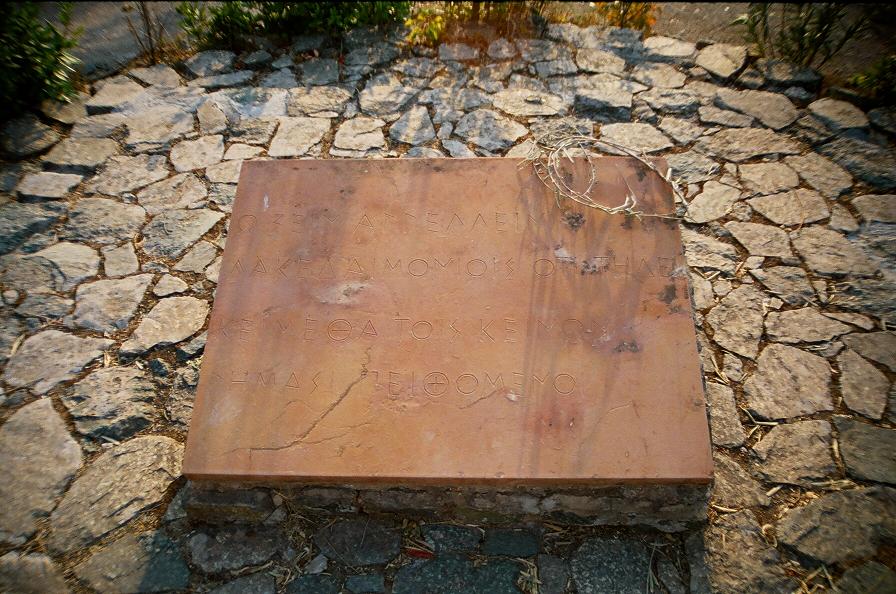
Modern copy of Simonides' epigram set up on Kolonos Hill
Kolonos Hill
Although Herodotus’ account (7.223-224) of the last stand at Thermopylae does not explicitly mention a hill, the last stand of the hoplites defending the pass was closely associated with one. The hill upon which the defenders are said to have died is Kolonos Hill, in the pass of Thermopylae and, there, the famous epigram of Simonides was erected (Herodotus 7.228), where a modern reconstruction stands today. The archaeologist Spyridon Marinatos excavated the hill in 1939 and found large numbers of Persian arrowheads which, he claimed, corroborated the hill’s identity as the place where the Spartans had made their last stand. Herodotus makes explicit that this stand was for the defense of all Hellas (7.135.3, 139.5, 145.2). Although this idea has been questioned by recent scholars, it is Herodotus’ ideology that is best reflected in the modern phrase “a hill I’m willing to die on.”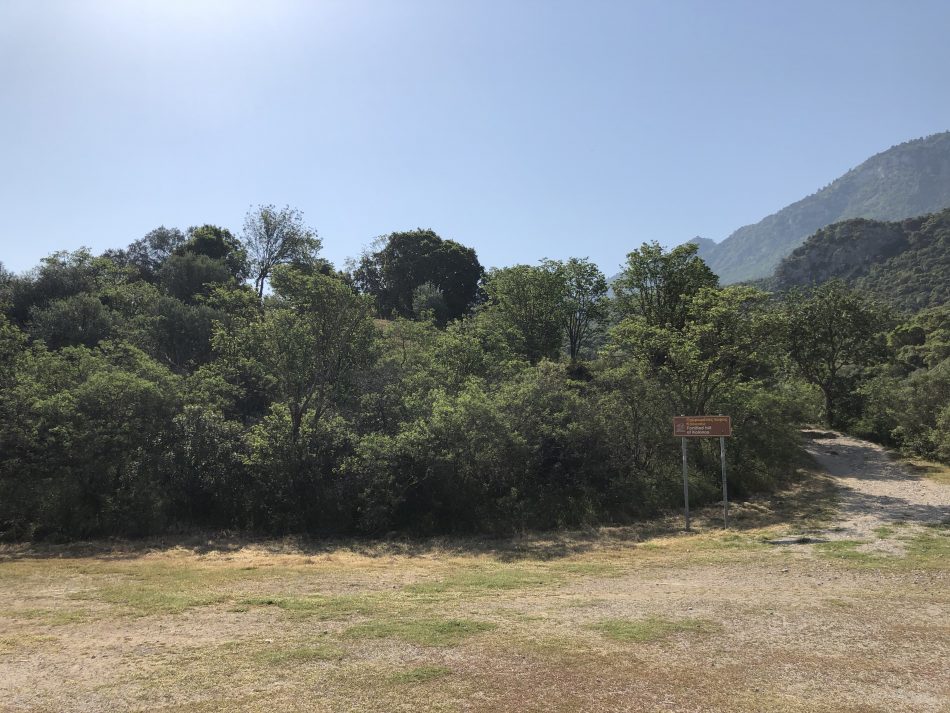
The Hill of Kolonos, Thermopylae, August 2021
Modern representations of the battle of Thermopylae have claimed that only 300 Spartans fought to the last, but they were far from alone: at the last stand, 700 Thespians fought next to the Spartans. 400 Thebans probably fought there too, although Herodotus' account is biased against them (and he claims they fought against their will and surrendered).The crucifixion
There is, of course, another hill upon which a man knowingly died for his beliefs, namely Jesus of Nazareth on the hill of Golgotha or Calvary (Luke 23:33, Matthew 27:33, Mark 15:22, John 19:17). Even though this would seem to be the perfect origin of the phrase (and it has been used in religious contexts, even usurped by recent Christian texts), it is not at all clear if the place where Jesus was crucified outside Jerusalem was, in fact, a hill. What is more, the modern phrase does seem to have been associated with military actions in its earliest uses, and not Christian ones. The sense of sacrifice and predetermined fate connect them, however. Golgotha seems to have meant “skull” and the Koine Greek of the Gospels use kranion and kraniou topos to explain the Hebrew which means the same. Jerome, translating the bible into Latin in the late fourth century AD, translated the Greek phrase as calvariae locus (from where we get Calvary). This, therefore, seems to mean “place of the skull” (place translating topos or locus) but, since the sixth century at least, Calvary was interpreted as a hill (taking ‘skull’ (or kranion/cranium) as the description of a topographical feature, not as a location of execution and death).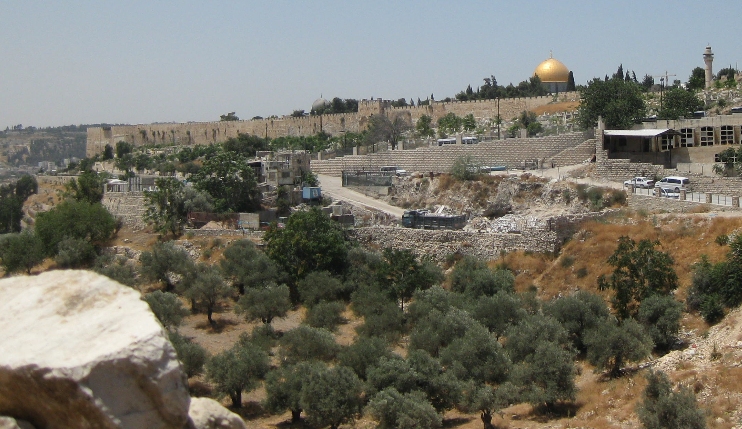
Golgotha?
Appropriate sacrifice
Urbandictionary.com defines the term ‘a hill I am willing to die on’ as a military expression. This site and other commentators point out that the term is usually used in the negative or questioning sense (as in ‘not a hill I am willing to die on’ and ‘do you really want to die on that hill?’). The phrase, therefore, refers to a position that the speaker may regard as important, but one they are (or should be) unwilling to die for. The negative position and the act of questioning also imply that the answer should be ‘no’ and that the person being asked will lose the argument and so should back down. At the same time, however, the phrase recognizes that there are some positions for which that proposition would be true, and the phrase has been occasionally (and is increasingly) used in this context (especially in a flippant manner where the 'hill' the poster is willing to die on is of little significance). In more recent uses on the internet, the phrase has been used positively by people posting ‘this is a hill I am willing to die on.’ Urbandictionary sees the phrase as actually encouraging retreat from a position (the hill) under attack – this too seems to misunderstand the idea that there is a position which the speaker defends and for which the speaker would be willing to die. The negative uses of the phrase imply that the attitude (of willing to die on this hill) are misguided and, although it recognizes that there may be a position for which that sacrifice would be appropriate, that situation is not (or may not) be the current one. This, however, turns the phrase into a difference of opinion rather than a statement of a willingness to make (the ultimate) sacrifice.
Ernest Hemingway's "For Whom the Bell Tolls", Scribner 1940
Hemingway
Yet, the citations for the phrase ‘hill to die on’ on Wiktionary only begin with Ernest Hemingway’s For Whom the Bell Tolls in 1940 (thereafter only 21st century examples are given (beginning in 2003). There are other examples between 1940 and 2003 - such as in statements on early childhood education by Wilson Riles in 1975 (See Wilson C. Riles ‘ECE in California Passes Its First Tests,’ The Phi Delta Kappan 57 (September 1975): 3-7). These uses imply that the phrase was already fully assimilated into the idiom to be used in such a (non-military) context. The phrase was also used in 1984 (Michael Cohen Employee Handbook for On-the-Job Survival (Oak Park, IL: Canoe Press, 1984: 13) in the context of intra-office politics: "What is my chance of winning if I engage in a “toe-to-toe” battle with my co-workers or boss on this issue? Is the problem so critical to me that I am willing to pull all the stops to get what I want? Is this the “hill I am willing to die on” – the one I am willing to go down fighting for?" This usage certainly has the sense of the importance of the issue at stake as well as the idea of sacrifice (also implied in ‘pull all the stops’) but not an idea associated with the battles of the Vietnam War (especially not the depiction of Hamburger Hill in the film of the same name which came out in 1987). It is clear from Hemingway (whose passage talks about how many men in history have used a hill to die on), however, that he had earlier examples in mind, and military ones at that.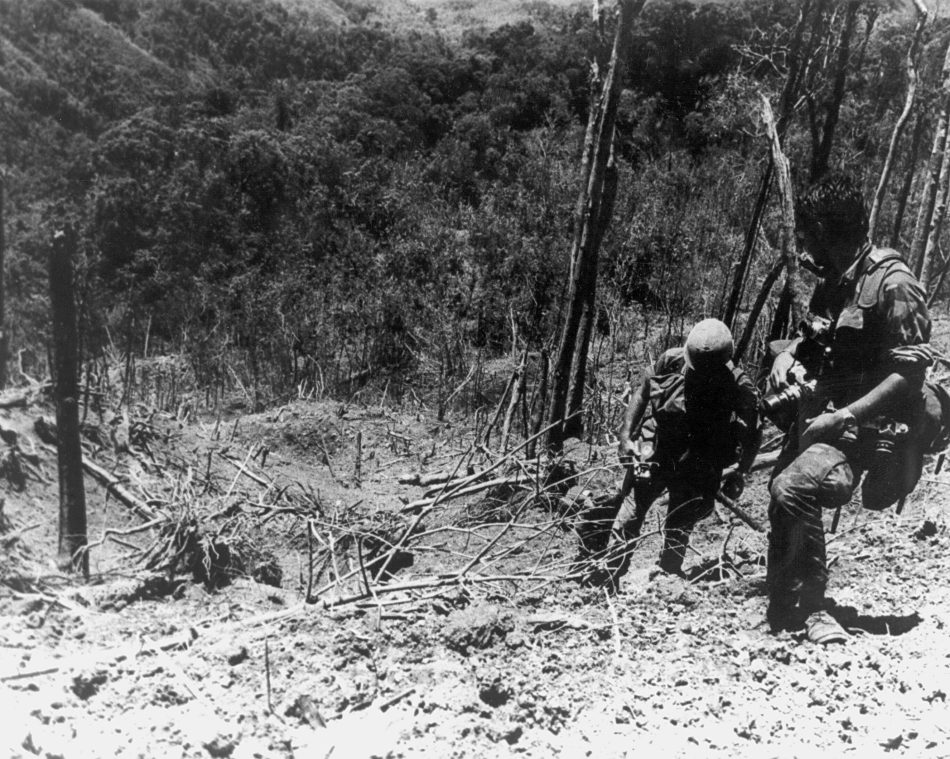
Aftermath of the Battle for Hill 937 in 1969
A similar phrase was used in 1972 regarding Hamburger Hill – an American soldier responded “Why die on Hamburger Hill?” to a journalist’s question. This was reported in an article called ‘Do It’ about marijuana smoking amongst American troops and so does not imply the same level of meaning as is usually understood in ‘a hill to die on.’ At the same time, it is easy to see how that answer could have confused the association.Defending the hill
Another website, grammarist.com, explores the phrase, arguing that it became popular in the 1980s and defines ‘the hill you want to die on’ as: "something so important to you that you are willing to fight to the death to accomplish it. Often, the idiom the hill you want to die on is used when describing something that will make or break one’s reputation, or result in either glory or ignominy. The phrase is often used in a question: Is this the hill you want to die on? This question may be considered a warning that taking a certain stance will probably result in defeat of one sort or another. The idiom the hill you want to die on is derived from a military term. Fighting to take the position of a hill from an enemy is nearly impossible and results in mass casualties. One must be sure that the hill is worth the cost of taking it." The idea of taking a hill (as opposed to defending a position) are here confused – certainly in terms of the way the phrase is used is in that of defending a position, not attacking one. In this regard, the battles of the ancient and medieval worlds offer far better parallels than any in more recent military history (both Hamburger Hill and Little Big Horn involved attacks rather than defense). Even Hemingway’s usage was taken from defending a hill. Tracing the idea back to Hemingway in 1940 precludes the influence of battles from Second World War battles as well as later ones. It would, however, allow for Little Big Horn in 1876 to be an influence. The campaign and battle of Little Big Horn do not suggest positions of such moral importance that dying there was ‘the right thing to do,’ however. In the immediate aftermath of the battle, the defeat was presented as a heroic action but more and more, Little Big Horn is viewed as a tactical blunder by Custer who underestimated the enemy and died fighting, perhaps even throwing his men’s lives away unnecessarily. Those criticisms of Custer in fact began soon after the battle (at a U.S. Army Court of Inquiry in 1879 especially) although some contemporaries admired Custer and his conduct and the media certainly perpetuated a positive spin on the battle. There was enough controversy around the battle, however, that it being the origin of the phrase (or even an example of it) is very doubtful. The idea of dying for one man’s blunder, ego, or inability to see they have made a mistake, is not inherent in the phrase at all. And so, the example of Little Big Horn is entirely inappropriate. The idea of achieving glory is also one which is commonly associated with the phrase ‘a hill I’m willing to die on’ and yet the phrase itself does not imply that – moral certitude rather than glory is the tone. Once again, the best fit comes from ancient battles, Thermopylae in particular.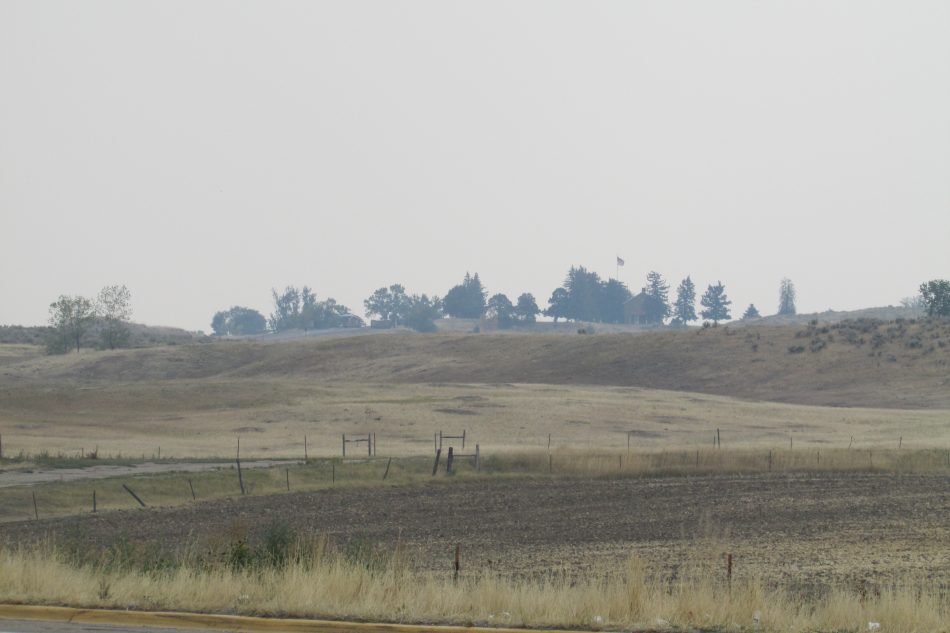
Little Bighorn, Greasy Grass or Last Stand Hill
Foreknowledge
Associations with both Hamburger Hill and Last Stand Hill also seem to miss the point of the phrase. It implies foreknowledge of doom, impending death, and the rightness of one’s decision in being there and deciding to sacrifice oneself for that position. These are qualities missing from both the battles of Hamburger Hill and Little Big Horn, but are present in the uses of the phrase (in both the negative and questioning uses and in the positive uses of the phrase). The idea of deliberate sacrifice and moral certitude are, however, elements both present at Thermopylae (and Calvary) and other examples that followed it (and even sought to emulate it). According to Herodotus (7.220.3-4), the oracle at Delphi had foretold that for Sparta to remain free from Persian domination, a Spartan king needed to die. Leonidas’ foreknowledge (or at least his willingness to accept his fate) is a quality inherent in the phrase – yet one missing in the other (later) examples cited for its genesis. This perspective of Leonidas and the 300 at Thermopylae is perfectly summed up, with the added idea of their sacrifice, by Aelian (Varia Historia 3.25): "Leonidas the Spartan and his force of three hundred accepted the death that was prophesied for them at Thermopylae. After a brave and noble struggle on behalf of Greece they met a glorious end and left behind them an immortal reputation and a good name for eternity."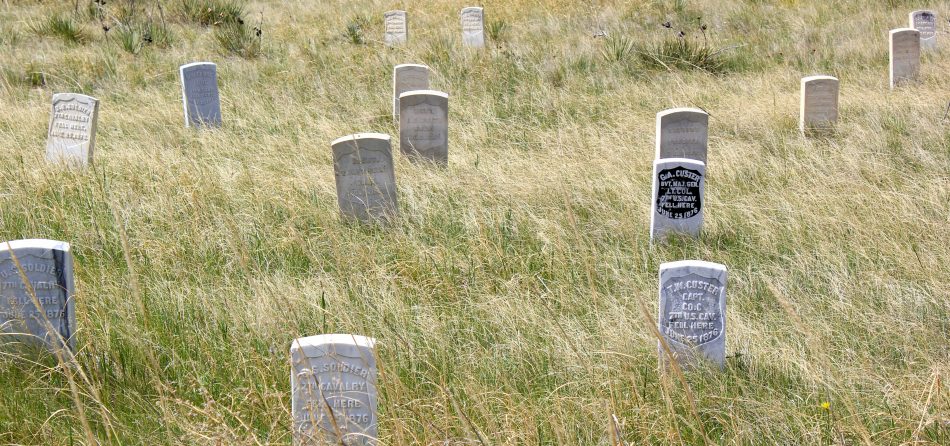
US Cavalry grave markers on Last Stand Hill
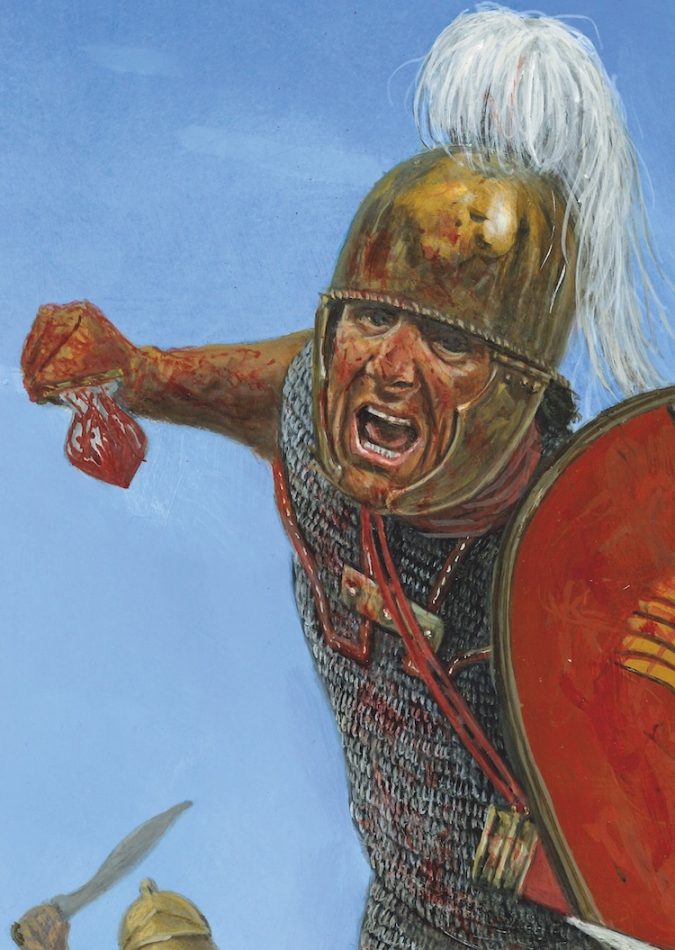 Last stand on Sicily
Last stand on Sicily
Image (right): Last stand at Camarina by Sean Ó Brógáin from Ancient Warfare XV.1
Another example of a battle from the ancient world which explicitly followed the example of Thermopylae is the battle of Camarina in southern Sicily, fought in 258 BC. There a Roman tribune knowingly led 300 men to their certain death on a small hill in order to allow the remainder of the Roman army to escape the Carthaginians. The ancient sources made explicit the comparison with Thermopylae (also reinforcing the idea of a hill there). Interestingly, the smallness of the hill is emphasized in some accounts - Cato has the Romans occupy a verrucam (a “wart”), Cato’s word which receives a gloss from Gellius for a “high and rough bit of ground.” Florus has the setting in a forest, although he also has a knoll (tumulum), as does Orosius. The Romans seized this position where they were attacked, surrounded (and died). For more on the Battle of Camarina see Ancient Warfare 15.1.
There are several other examples from ancient and medieval military history which make much more sense of the phrase than those taken from modern military history. There were other battles in the ancient world where men met their ends on hills. Think of the battle of Adrianople in AD 378 (Sozomen Ecclesiastical History 6.40, Ammianus 31.13.8), or the battle of Carrhae in 53 BC (Plutarch Crassus 23-27, Cassius Dio 40.21-24) where Crassus’ son Publius led his surviving men to a hill – nearly all were massacred. These seem to be the results of mistakes or unexpected defeats, however. Even a battle like the Horns of Hattin, fought in 1187, where the knights of the Crusader States, and the Knights Hospitaller and Templar, were cut down by Saladin’s forces, has parallels. There, the remaining men retreated to a hill, the double hill of the Horns of Hattin. Most died, though many of the aristocracy were captured, however, as was the King of Jerusalem, Guy of Lusignan. This battle also involved an element of moral certitude in the Crusader cause (no matter how misplaced) and the crusaders had been warned of their doom if they marched without access to water – they marched anyway. The forces of Guy, however, seem to have believed they would win – and this is the element missing from the phrase. The idea of being ‘willing to die on a hill’ implies a sense of predetermination, combined with a moral certitude in the rightness of your own position regardless of the outcome but with an expectation of defeat and death - exactly the kinds of behaviour shown by Leonidas and the men who followed him at Thermopylae in 480 BC. 
The Horns of Hattin, Israel


1 comment
Superior article on the theory of people believing with such certainty that the position they’re taking is worth dying for